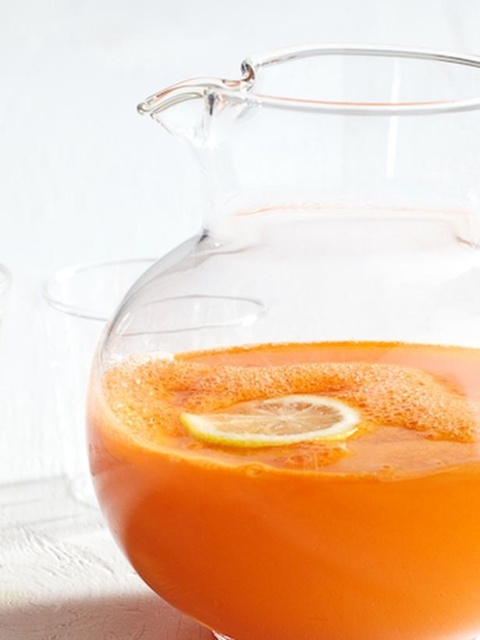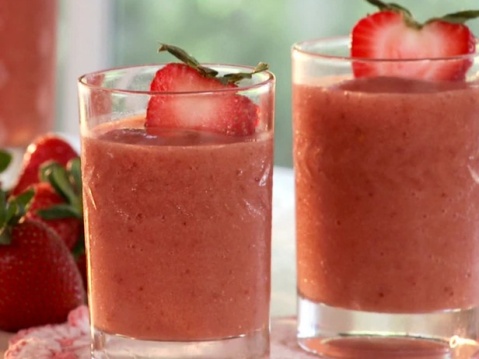Listen to/view CDC podcasts on your computer or download them for reliable health and safety information when and where you want it. New to podcasting? See Podcast Help and RSS Help
PHYLLOQUINONE INTAKE AND RISK OF CARDIOVASCULAR DISEASES IN MEN
Dietary patterns high in fruits and vegetables have been associated with lower risk of cardiovascular diseases. The association between phylloquinone intake, derived mainly from green vegetables, and risk of cardiovascular diseases [total and fatal coronary heart disease (CHD), non-fatal myocardial infarction, total and ischemic stroke] was prospectively assessed in 40087 men who participated the Health Professionals’ Follow-up Study during 1986-2000. There were 1857 CHD events and 617 strokes. After adjustment for lifestyle factors, the relative risks of CHD in increasing quintile categories of phylloquinone intake were 1 (reference), 0.84, 0.87, 0.82 and 0.84, respectively (P for trend 0.05). However, the risks of CHD events and strokes did not remain significantly associated with phylloquinone intake after adjustment for lifestyle and other dietary factors. These results suggest that high phylloquinone intake may be a marker of a diet that is associated with lower CHD risk, but has little or no independent association.
Beneficial
Research involving the molecular biology and the determination of the genetic mechanisms of aging provides cutting edge information on how to forestall or reverse the deleterious effects of aging. However, practical information that may be derived from this research is probably years away. Given that the population of the US and other countries continues to age and the numerous motor and cognitive deficits seen in aging will increase. This has already begun to seriously tax the health care system in the US. If this is the case, then it becomes prudent to try to establish other methods that may be utilized today to alter the course of aging. Numerous epidemiological studies have indicated that individuals who consume a diet containing high amounts of fruits and vegetables lower their risk of developing age-related diseases such as Alzheimer Disease. Research from our laboratory has suggested that dietary supplementation with fruit or vegetable extracts high in antioxidants (e.g., blueberry, spinach) can decrease the enhanced vulnerability to oxidative stress (OS) that occurs in aging and that these reductions are expressed as improvements in behavior. Additional research has suggested that these beneficial effects may involve much more than the antioxidant/anti-inflammatory effects. It appears that the very powerful actions of the polyphenolic compounds found in fruits such as blueberries may also involve affecting MAP kinase signaling and neuronal communication.
50 smoothies
http://www.nutrition-and-you.com/fruit-nutrition.html
Fruit’s health benefiting properties are because of their richness in vitamins, minerals, micro-nutrients, anti-oxidants, which helps the body prevent or at least prolong the natural changes of aging by protecting and rejuvenating cells, tissues and organs. Their overall benefits are manifold! Fruit nutrition benefits are infinite! You are protecting yourself from minor ailments like wrinkling of skin, hair-fall, and memory loss to major ailments like age-related macular degeneration (AMRD) of the retina in the eyes, Alzheimer’s disease, colon cancers, weak bones (osteoporosis)…etc., and the list of fruit nutrition benefits never ends!
Here is an impressive list of fruits with complete illustrations of their
health benefits and nutrition facts:
Acai berry Apple Apricot
Avocado Banana Blackberries
Black currants Blueberries Cantaloupe
Cherimoya Cherry Chokeberry
Cranberries Dates Durian fruit
Figs Gooseberries Grapes
Grapefruit Guava Jackfruit
Kiwi fruit Kumquat Lemon
Loquat fruit Lychee Mango fruit
Mangosteen Mulberries Olives
Orange Papaya Passion fruit
Peaches Pears Persimmon fruit
Pineapple Plums Pomegranate
Quince fruit Raspberry Sapodilla(Sapote)
Star fruit Strawberry Tangerine
Watermelon
Sunrise smoothie
http://www.nutrition-and-you.com/fruit-nutrition.html
Fruit nutrition facts
Welcome to the fruit nutrition page.
Why fruits?
Fruits are nature’s wonderful medicines packed with vitamins, minerals, anti-oxidants and many phyto-nutrients (Plant derived micronutrients). They are an absolute feast to our sight, not just because of their color and flavor but their unique nutrition-profile that help the body stay fit and healthy!
Fruits are low in calories and fat and are a source of simple sugars, fiber, and vitamins, which are essential for optimizing our health.
Fruits provide plenty of soluble dietary fiber, which helps to ward of cholesterol and fats from the body and to get relief from constipation as well.
Fruits contain many anti-oxidants like poly-phenolic flavonoids, vitamin-C, and anthocyanins. These compounds, firstly, help human body protected from oxidant stress, diseases, and cancers, and secondly; help the body develop capacity to fight against these ailments by boosting our immunity level. Many fruits, when compared to vegetables and cereals, have very high anti-oxidant value, which is something measured by their “Oxygen Radical Absorbent Capacity” or (ORAC).
Anthocyanins are flavonoid category of poly-phenolic compounds found in some “blue-fruits” like blue-black grapes, mulberries, acai berry, chokeberry, blueberries, blackberries, and in many vegetables featuring blue or deep purple color. Eating fruits rich in blue pigments offers many health benefits. These compounds have potent anti-oxidant properties, remove free radicals from the body, and thus offer protection against cancers, aging, infections, etc. These pigments tend to concentrate just underneath the skin.
Fruit’s health benefiting properties are because of their richness in vitamins, minerals, micro-nutrients, anti-oxidants, which helps the body prevent or at least prolong the natural changes of aging by protecting and rejuvenating cells, tissues and organs. Their overall benefits are manifold! Fruit nutrition benefits are infinite! You are protecting yourself from minor ailments like wrinkling of skin, hair-fall, and memory loss to major ailments like age-related macular degeneration (AMRD) of the retina in the eyes, Alzheimer’s disease, colon cancers, weak bones (osteoporosis)…etc., and the list of fruit nutrition benefits never ends!
Piña colada smoothie
http://www.nutrition-and-you.com/pineapple.html
Health benefits of Pineapple fruit
Fresh pineapple is low in calories. Nonetheless, ii is a storehouse of several unique health promoting compounds, minerals and vitamins that are essential for optimum health.
100 g fruit provides just about 50 calories equivalent to that of apples. Its flesh contains no saturated fats or cholesterol; however, it is rich source of soluble and insoluble dietary fiber like pectin.
Pineapple fruit contains a proteolytic enzyme bromelain that digests food by breaking down protein. Bromelain also has anti-inflammatory, anti-clotting and anti-cancer properties. Studies have shown that consumption of pineapple regularly helps fight against arthritis, indigestion and worm infestation.
Fresh pineapple is an excellent source of antioxidant vitamin; vitamin C. 100 g fruit contains 47.8 or 80% of this vitamin. Vitamin C is required for the collagen synthesis in the body. Collagen is the main structural protein in the body required for maintaining the integrity of blood vessels, skin, organs, and bones. Regular consumption of foods rich in vitamin C helps the body protect from scurvy; develop resistance against infectious agents (boosts immunity) and scavenge harmful, pro-inflammatory free radicals from the body.
It also contains small amount Vitamin A (provides 58 IU per 100 g) and beta-carotene levels. These compounds are known to have antioxidant properties. Vitamin A is also required maintaining healthy mucus membranes, skin and essential for vision. Studies have suggested that consumption of natural fruits rich in flavonoids helps the human body to protect from lung and oral cavity cancers.
In addition, this fruit is rich in B-complex group of vitamins like folates, thiamin, pyridoxine, riboflavin and minerals like copper, manganese and potassium. Potassium is an important component of cell and body fluids, helps controlling heart rate and blood pressure. Copper is a helpful cofactor for red blood cell synthesis. Manganese is a co-factor for the enzyme superoxide dismutase, which is a very powerful free radical scavenger.
Mango delight smoothie
http://www.nutrition-and-you.com/mango-fruit.html
Health benefits of Mangoes
Mango fruit is rich in pre-biotic dietary fiber, vitamins, minerals, and poly-phenolic flavonoid antioxidant compounds.
According to new research study, mango fruit has been found to protect against colon, breast, leukemia and prostate cancers. Several trial studies suggest that polyphenolic anti-oxidant compounds in mango are known to offer protection against breast and colon cancers.
Mango fruit is an excellent source of Vitamin-A and flavonoids like beta-carotene, alpha-carotene, and beta-cryptoxanthin. 100 g of fresh fruit provides 765 mg or 25% of recommended daily levels of vitamin A. Together; these compounds are known to have antioxidant properties and are essential for vision. Vitamin A is also required for maintaining healthy mucus membranes and skin. Consumption of natural fruits rich in carotenes is known to protect the body from lung and oral cavity cancers.
Fresh mango is a good source of potassium. 100 g fruit provides 156 mg of potassium while just 2 mg of sodium. Potassium is an important component of cell and body fluids that helps controlling heart rate and blood pressure.
It is also a very good source of vitamin-B6 (pyridoxine), vitamin-C and vitamin-E. Consumption of foods rich in vitamin C helps the body develop resistance against infectious agents and scavenge harmful oxygen-free radicals. Vitamin B-6 or pyridoxine is required for GABA hormone production within the brain. It also controls homocystiene levels within the blood, which may otherwise be harmful to blood vessels resulting in CAD and stroke.
Further, it composes moderate amounts of copper. Copper is a co-factor for many vital enzymes, including cytochrome c-oxidase and superoxide dismutase (other minerals function as co-factors for this enzyme are manganese and zinc). Copper is also required for the production of red blood cells.
Additionally, mango peel is also rich in phytonutrients, such as the pigment antioxidants like carotenoids and polyphenols.
Mango smoothie
http://www.nutrition-and-you.com/mango-fruit.html
Nutritional facts
Carrot juice
http://www.nutrition-and-you.com/carrots.html
FOOD SUMMARY
Nutrition facts label for Carrots, raw [Includes USDA commodity food A099]
This feature requires Flash player to be installed in your browser. Download the player here.
Download Printable Label Image Nutritional Target Map
Nutritional Target Map for Carrots, raw [Includes USDA commodity food A099]
This feature requires Flash player to be installed in your browser. Download the player here.
3.8 4.2 Fullness FactorND Rating
NutritionData’s
Opinion
Weight loss:
Optimum health:
Weight gain:
The good: This food is very low in Saturated Fat and Cholesterol. It is also a good source of Thiamin, Niacin, Vitamin B6, Folate and Manganese, and a very good source of Dietary Fiber, Vitamin A, Vitamin C, Vitamin K and Potassium.
The bad: A large portion of the calories in this food come from sugars.
Caloric Ratio Pyramid
Caloric Ratio Pyramid for Carrots, raw [Includes USDA commodity food A099]
This feature requires Flash player to be installed in your browser. Download the player here.
89% 5% 6%
Carbs Fats Protein
3 209
moderately anti-inflammatory
Read More http://nutritiondata.self.com/facts/vegetables-and-vegetable-products/2383/2#ixzz2WB5CtZ00









